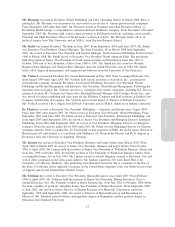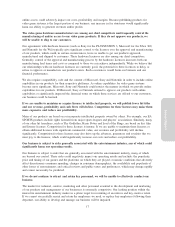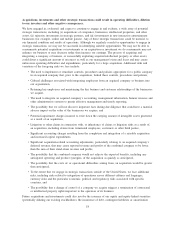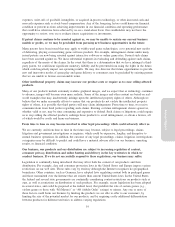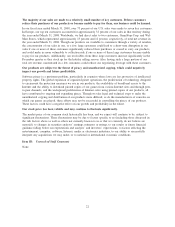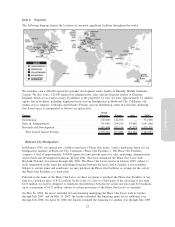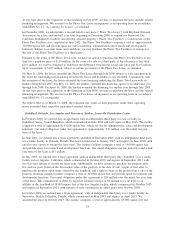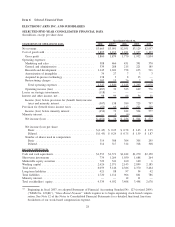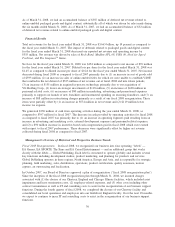Electronic Arts 2008 Annual Report Download - page 97
Download and view the complete annual report
Please find page 97 of the 2008 Electronic Arts annual report below. You can navigate through the pages in the report by either clicking on the pages listed below, or by using the keyword search tool below to find specific information within the annual report.
Changes in our tax rates or exposure to additional tax liabilities could adversely affect our earnings and
financial condition.
We are subject to income taxes in the United States and in various foreign jurisdictions. Significant judgment
is required in determining our worldwide provision for income taxes, and, in the ordinary course of our
business, there are many transactions and calculations where the ultimate tax determination is uncertain.
We are also required to estimate what our tax obligations will be in the future. Although we believe our tax
estimates are reasonable, the estimation process and applicable laws are inherently uncertain, and our estimates
are not binding on tax authorities. Our effective tax rate could be adversely affected by our profit level, by
changes in our business or changes in our structure resulting from the reorganization of our business and
operating structure, changes in the mix of earnings in countries with differing statutory tax rates, changes in
the elections we make, changes in applicable tax laws as well as other factors. Further, our tax determinations
are regularly subject to audit by tax authorities and developments in those audits could adversely affect our
income tax provision. Should our ultimate tax liability exceed our estimates, our income tax provision and net
income or loss could be materially affected.
We incur certain tax expenses that do not decline proportionately with declines in our consolidated pre-tax
income or loss. As a result, in absolute dollar terms, our tax expense will have a greater influence on our
effective tax rate at lower levels of pre-tax income or loss than higher levels. In addition, at lower levels of
pre-tax income or loss, our effective tax rate will be more volatile.
We are also required to pay taxes other than income taxes, such as payroll, sales, use, value-added, net worth,
property and goods and services taxes, in both the United States and various foreign jurisdictions. We are
regularly under examination by tax authorities with respect to these non-income taxes. There can be no
assurance that the outcomes from these examinations, changes in our business or changes in applicable tax
rules will not have an adverse effect on our earnings and financial condition.
Changes in our worldwide operating structure or the adoption of new products and distribution models
could have adverse tax consequences.
As we expand our international operations, adopt new products and new distribution models, implement
changes to our operating structure or undertake intercompany transactions in light of changing tax laws,
expiring rulings, acquisitions and our current and anticipated business and operational requirements, our tax
expense could increase. For example, in the fourth quarter of fiscal 2006, we repatriated $375 million under
the American Jobs Creation Act of 2004. As a result, we recognized an additional one-time tax expense in
fiscal 2006 of $17 million.
Our reported financial results could be adversely affected by changes in financial accounting standards
or by the application of existing or future accounting standards to our business as it evolves.
As a result of the enactment of the Sarbanes-Oxley Act and the review of accounting policies by the SEC and
national and international accounting standards bodies, the frequency of accounting policy changes may
accelerate. For example, as discussed in Note 10 of the Notes to Consolidated Financial Statements, FIN No. 48
has affected the way we account for income taxes and may have a material impact on our financial results.
Our adoption of Statement of Financial Accounting Standard (“SFAS”) No. 141(R) will have a material impact
on our Consolidated Financial Statements for material acquisitions consummated after March 29, 2009.
Similarly, changes in accounting standards relating to stock-based compensation require us to recognize
significantly greater expense than we had been recognizing prior to the adoption of the new standard.
Likewise, policies affecting software revenue recognition have and could further significantly affect the way
we account for revenue related to our products and services. For example, we expect a more significant
portion of our games will be online-enabled in the future and we could be required to recognize the related
revenue over an extended period of time rather than at the time of sale. As we enhance, expand and diversify
our business and product offerings, the application of existing or future financial accounting standards,
particularly those relating to the way we account for revenue and taxes, could have a significant adverse effect
on our reported results although not necessarily on our cash flows.
Annual Report
21




